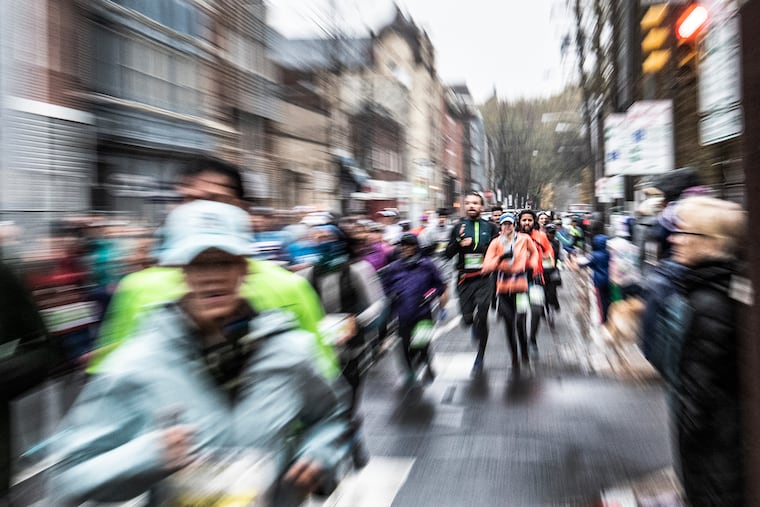Sports psychologist’s 4 tips to mentally prepare for Philly Marathon | Expert Opinion
Fall marathoners are facing several unprecedented challenges this year. Some have waited two years to race The Philadelphia Marathon after last year’s in-person race was canceled due to COVID.

Fall marathoners are facing several unprecedented challenges this year. Some have waited two years to race the Philadelphia Marathon after last year’s in-person race was canceled because of COVID-19. Some will find themselves running alongside thousands of fellow competitors after running solo for 20 months.
If that’s not enough adversity, marathoners know that in order to succeed they need to conquer the mental obstacles that come along the 26.2-mile course. One big obstacle is pushing past the dreaded marathon “wall.” But, as a sports psychologist and marathoner, I know runners can persevere in tough conditions.
To help ensure that you are fully prepared for the Nov. 21 race, I suggest that you have a mental game plan to keep your mind at ease and your focus where it belongs.
Here are some of my top tips:
1. If you’re nervous about COVID-19, you are not alone. Mostly everyone is looking to avoid too much close contact with others. That said, you are more in control than you might think. You can wear your mask, you can keep a good distance from people, and you can remind yourself that by choosing to run, you are doing something beneficial for your physical and mental health. Many of us are in closer contact while waiting to check out at grocery stores than we will be running the course. And remember that the race requires that all runners show proof of full vaccination.
So once you pick up your number and get to the start line, try to purposefully and mindfully focus on the fact that you are healthy and ready to go. Keep your focus on your pacing, your fueling, and enjoying the beautiful fall scenery around Philadelphia.
2. Even seasoned marathoners have great respect for “the wall,” which tends to show up about mile 20 (often the longest distance people will have run in training). Avoiding the wall has a lot to do with:
How well you pace yourself.
The nutrition you take in.
The consistency and effectiveness of your training.
The essential mental component is how well you keep your mind open and curious when your muscles and your head try to convince you that you can’t keep going. I like the mantra “stay curious” for runners to use to talk back to the negative mind chatter. By keeping an open, curious mind, runners know that any pain is temporary and that distracting themselves by focusing outward to the crowd or inward toward gaining better form can help conquer the wall.
3. Visualization is key to getting through those tough miles later in the race. During the week leading up to the marathon, imagine yourself reaching the 20-mile marker, and picture yourself in good form, smiling, sipping water, and reciting your encouraging mantra. There’s proven psychological benefit to the phrase “seeing is believing.”
4. The key to race-day success starts when the race begins. It is important to have the patience to not go out too hard or too fast, even if your legs feel fresh and the adrenaline is flowing. Seasoned marathoners will tell you that if you start too fast, it’s hard to slow yourself down. You are always much better off saving anything you have in the tank for later in the race when your legs feel heavier and the race is closer to being finished.
Take all your hard work and training and add these mental game tips to your race day plan. Remember you are running the Philadelphia Marathon to challenge yourself and have fun doing it. So, enjoy the journey and celebrate the return to racing.
Mitchell Greene is a clinical and sport psychologist, and endurance athlete, with a private practice in the suburbs of Philadelphia. For more information, go to greenepsych.com.